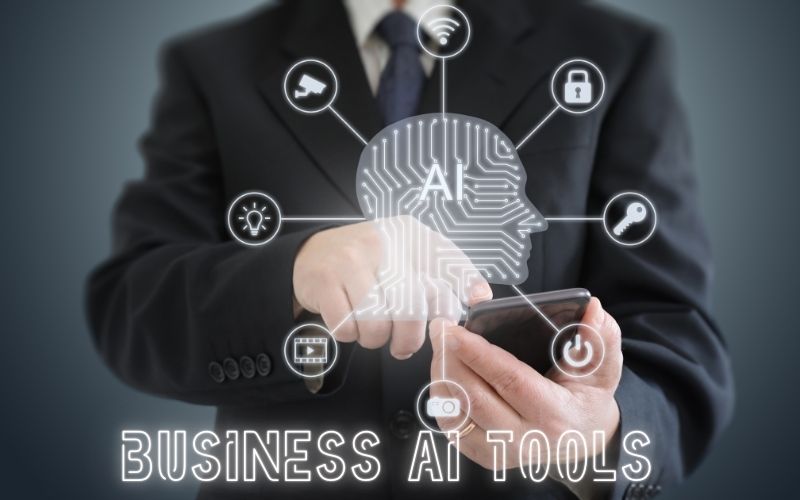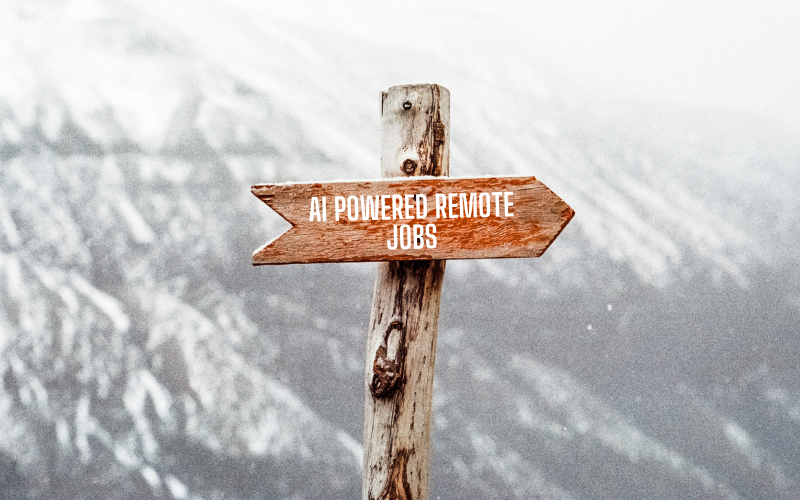With the rapid advancement of technology, particularly in the field of artificial intelligence (AI), the nature of work is undergoing a profound transformation. One of the most significant changes is the rise of remote work, which has been accelerated by AI. Building a remote career in the age of artificial intelligence offers numerous benefits that can greatly enhance work-life balance, productivity, and career growth.
Table of Contents
ToggleBenefits of Building a Remote Career in the Age of Artificial Intelligence
Flexibility and Work-Life Balance: A remote career allows individuals to have greater control over their work schedule and location. This flexibility enables individuals to achieve a better balance between their personal and professional lives. With AI-powered tools and platforms, remote workers can collaborate effectively with colleagues and clients, regardless of geographical limitations. Whether it’s working from home, a co-working space, or while traveling, remote work offers the freedom to create a schedule that suits individual needs.
Increased Job Opportunities: The integration of AI in various industries has led to the creation of new roles and job opportunities. Remote work, particularly in AI-related fields such as data analysis, machine learning, and virtual assistance, provides a wide range of positions that can be performed remotely. This opens up opportunities for individuals to find meaningful and well-paying jobs without being restricted by geographical boundaries.
Cost Savings: Building a remote career eliminates the need for daily commuting, which can be both time-consuming and expensive. Remote workers save on transportation costs, fuel expenses, and wear and tear on their vehicles. Moreover, remote work eliminates the need for a physical office space, reducing overhead costs for both individuals and companies. This cost-saving aspect allows individuals to allocate their resources more efficiently, contributing to financial stability and overall well-being.
Increased Productivity: Remote work often leads to higher productivity levels due to the elimination of office distractions and the ability to work in a comfortable environment. With AI tools and technologies, remote workers can automate repetitive tasks, allowing them to focus on more complex and strategic responsibilities. AI-powered communication platforms and project management tools enable seamless collaboration, enhancing efficiency within remote teams.
Global Networking: In the age of AI, geography is no longer a barrier to networking and professional growth. Remote work enables individuals to connect with professionals and organizations from around the world, fostering multicultural perspectives and diverse collaborations. Expanding professional networks globally can lead to new opportunities, knowledge sharing, and innovative ideas.
Personal and Professional Development: Building a remote career requires self-discipline, time management, and the ability to adapt to different work environments. These skills contribute to personal and professional growth, enhancing resilience, creativity, and problem-solving abilities. Additionally, remote work encourages continuous learning as individuals must stay updated with the latest AI technologies and trends to remain competitive.

Key Skills Required for Remote Work in the Era of Artificial Intelligence
In today’s digital age, remote work has become increasingly popular, especially with the advancements in technology and the rise of artificial intelligence (AI). Working remotely offers numerous benefits, such as flexible schedules, increased productivity, and reduced commuting time. However, in order to succeed in building a remote career in the age of AI, there are certain key skills that are essential to possess.
Communication: Effective communication skills are crucial when working remotely. Since you won’t be physically present with your colleagues or team, the ability to clearly and concisely convey your thoughts and ideas through various communication channels, such as email, video calls, or instant messaging, is essential. This includes active listening, providing feedback, and asking clarifying questions to ensure effective collaboration.
Time Management: Remote work requires strong time management skills to remain productive and meet deadlines. Without a physical office environment, it can be easy to get distracted or lose track of time. Being able to prioritize tasks, set realistic goals, and stay organized is key to successfully managing your time and ensuring work is completed on schedule.
Adaptability: As technology continues to evolve, it is important to adapt and embrace new tools and platforms that are relevant to your remote work. This may include utilizing project management software, collaboration tools, or AI-powered systems. An openness to change and a willingness to learn new skills will set you apart in the age of AI.
Self-Motivation: Working remotely requires a high level of self-motivation and discipline. Without a supervisor or manager physically present, it is up to you to stay focused, stay on task, and meet your goals. Setting clear objectives, establishing a routine, and creating a dedicated workspace can help foster self-motivation and ensure consistent productivity.
Critical Thinking and Problem-Solving: AI technology is constantly evolving, and with it comes new challenges and problems to solve. Possessing strong critical thinking and problem-solving skills will enable you to navigate these challenges and find innovative solutions. The ability to analyze data, think creatively, and adapt to changing circumstances will be crucial in the age of AI.
Collaboration: While remote work may mean working independently, collaboration is still essential for success. This requires the ability to work well with others, both within and outside your organization. Utilizing communication tools and platforms effectively, actively participating in team discussions, and contributing to virtual meetings are all important aspects of remote collaboration in the age of AI.

Overcoming Challenges and the Future of Remote Work in the Era of Artificial Intelligence
Remote work has become increasingly popular in recent years, and the advent of artificial intelligence (AI) has further accelerated this trend. While there are numerous benefits to building a remote career in the age of AI, there are also unique challenges that come with it. However, by understanding and addressing these challenges, individuals can pave the way for a successful remote career and embrace the future of work.
One of the main challenges of remote work in the era of AI is the lack of face-to-face interaction. Human connection and collaboration are important for fostering creativity, building relationships, and maintaining a sense of belonging in a work environment. To overcome this challenge, remote workers can leverage technology to create virtual spaces for collaboration, such as video conferences and project management tools. By utilizing these tools effectively, remote workers can bridge the physical distance and maintain strong working relationships with colleagues.
Another challenge is the potential for isolation and burnout. Without the structure and social interactions of a traditional office, remote workers may find it challenging to disconnect from work and maintain a healthy work-life balance. To address this, it is important for remote workers to establish clear boundaries between work and personal life. This can involve setting designated working hours, creating a dedicated workspace, and practicing self-care activities. Employers can also play a role by implementing policies that promote work-life balance and provide support for remote workers.
Despite these challenges, the future of remote work in the age of AI is promising. AI technologies can enhance productivity and efficiency, allowing remote workers to automate repetitive tasks and focus on more complex and creative work. For example, AI-powered chatbots can handle customer inquiries, freeing up time for remote workers to engage in strategic problem-solving. Additionally, the rise of virtual reality (VR) and augmented reality (AR) technologies can create immersive remote work environments, enabling remote workers to collaborate and interact in a more natural and engaging manner.
The future of remote work also holds opportunities for continuous learning and upskilling. As AI technologies continue to advance, individuals will need to acquire new skills and adapt to changing job requirements. Remote workers have access to a vast range of online learning platforms and resources, allowing them to acquire new skills and stay competitive in the job market. Embracing a growth mindset and being open to lifelong learning will be essential for building a successful remote career in the era of AI. For more on challenges and navigating them, see Navigating Challenges and Opportunities.
Effective Strategies for Building a Successful Remote Career in the Age of Artificial Intelligence
When it comes to building a successful remote career in the age of artificial intelligence, there are several effective strategies that can help professionals navigate this rapidly evolving landscape. With the rise of AI technologies, traditional job roles are being transformed, and remote work opportunities are becoming more prevalent. However, it is important to approach this new era with a strategic mindset and adapt to the changing dynamics. Here are some strategies to consider:
1. Embrace Lifelong Learning: In the age of artificial intelligence, continuous learning is crucial. Professionals should invest in upskilling and reskilling to stay relevant and competitive in their field. Pursuing online courses, attending webinars, and obtaining certifications can help remote workers keep pace with emerging technologies and industry trends.
2. Develop Strong Communication Skills: Effective communication is key in a remote work environment, especially when collaborating with team members from different locations. Remote workers should leverage technology tools such as video conferencing, instant messaging platforms, and project management software to maintain clear and open lines of communication.
3. Cultivate a Professional Network: Building a strong professional network is crucial for remote professionals. Joining industry-specific online communities, participating in virtual meetups, and attending webinars can provide valuable networking opportunities. Networking helps in sharing insights, getting job referrals, and staying up-to-date with industry news and trends.
4. Master Time Management: Remote work offers flexibility, but it also requires excellent time management skills. Establishing a routine, setting clear goals, and prioritizing tasks can help remote professionals stay productive and efficient. Utilizing productivity tools like time-tracking apps and project management software can aid in managing workloads effectively.
5. Stay Adaptable and Agile: The workplace is constantly evolving, and remote professionals must be adaptable and agile. Embracing change, being open to new technologies, and seeking opportunities for growth and innovation are critical for success in the age of AI.
6. Build a Strong Personal Brand: In a remote work environment, personal branding becomes even more important. Professionals should create an online presence by showcasing their skills and expertise through a portfolio website or professional blog. Actively engaging in industry-related discussions on social media platforms can also help in building a strong personal brand.
7. Foster Self-Motivation and Discipline: Remote work requires self-motivation and discipline. Professionals should set and maintain a schedule, create a dedicated workspace, and eliminate distractions to stay focused and productive. Building a routine and practicing self-care are essential for maintaining a healthy work-life balance.

The Impact of Artificial Intelligence on Remote Work Opportunities and Job Prospects
The rapid advancements in artificial intelligence (AI) have brought about significant changes in various industries, including the way we work. With AI becoming increasingly integrated into our daily lives, it is crucial to understand the impact it has on remote work opportunities and job prospects. This article will explore the various ways in which AI is shaping the future of remote work and the implications it holds for individuals seeking remote careers.
One significant impact of AI on remote work opportunities is the automation of certain tasks. With the introduction of AI-powered systems and algorithms, routine and repetitive tasks can be automated, making it easier for remote workers to focus on more complex and creative aspects of their jobs. This not only improves productivity but also opens up new opportunities for remote professionals to take on higher-value tasks that require human judgment and decision-making.
Furthermore, AI has revolutionized communication and collaboration in remote work. With the advent of video conferencing platforms, project management tools, and AI-powered chatbots, remote teams can now collaborate seamlessly from different parts of the world. AI can assist in scheduling meetings, organizing tasks, and even providing real-time language translations, removing barriers and enhancing communication channels for remote workers.
In addition to facilitating communication and task management, AI can also enhance remote work productivity through intelligent data analysis. By leveraging AI algorithms, remote workers can make more informed decisions by analyzing vast amounts of data quickly and accurately. This empowers them to identify trends, predict outcomes, and optimize their work processes, ultimately leading to improved productivity and efficiency.
However, it is important to note that while AI presents numerous opportunities for remote workers, it also poses certain challenges. One such challenge is the potential displacement of jobs. As AI systems become increasingly advanced, there is a possibility that certain roles may be replaced by automated technologies. While this may lead to job losses in some areas, it also opens up new avenues for remote workers to upskill and reskill in emerging fields of AI development, data analysis, and virtual collaboration.
Wrapping up
In an era dominated by artificial intelligence (AI), building a remote career offers countless benefits that can revolutionize the way we work. As discussed in this article, there are several key advantages to embrace remote work in the age of AI. Firstly, remote work allows individuals to break free from the confines of traditional office setups, providing flexibility and the opportunity to achieve a better work-life balance. This newfound flexibility enables professionals to circumvent geographical limitations, making it possible to work with clients and companies from all corners of the globe.
Moreover, a remote career in the age of AI allows individuals to tap into a vast pool of opportunities and reach a wider audience. As AI continues to automate various tasks, remote work provides professionals with the chance to focus on high-value activities that require human skills, such as creativity, critical thinking, and problem-solving. By honing and showcasing these key skills, remote workers can position themselves as valuable assets in an AI-driven world, ensuring their relevance and long-term success.
Of course, building a remote career in the age of AI does come with its challenges. One of the most significant obstacles remote workers face is the lack of physical presence and face-to-face interaction. However, advancements in technology and the increasing availability of virtual communication tools have partially bridged this gap. By leveraging video conferencing and collaboration platforms, remote workers can establish strong connections, foster effective teamwork, and maintain productive relationships with clients and colleagues, regardless of geographic boundaries.
Looking ahead, the future of remote work in the era of AI appears promising. As AI continues to evolve and automate routine tasks, more opportunities for remote work are likely to emerge. Professionals who are equipped with the right skills and adaptability will be well-positioned to thrive in this changing landscape. By staying up to date with technological advancements and continuously developing their skills, remote workers can stay ahead of the curve and remain competitive in an AI-driven job market.
To build a successful remote career in the age of AI, several strategies can be employed. Firstly, remote workers should focus on developing and enhancing skills that are highly valued in an AI-driven economy. This includes skills such as emotional intelligence, problem-solving, creativity, and adaptability. Additionally, remote workers should continuously upskill and stay abreast of the latest technological developments to ensure they remain relevant and indispensable in their respective industries.
Lastly, the impact of AI on remote work opportunities and job prospects cannot be overlooked. While AI may automate certain tasks, it also opens doors to new job roles and industries that have yet to be realized. Remote workers who position themselves as experts in these emerging fields, such as AI consultancy or remote project management, can tap into an array of exciting prospects. By embracing change and adapting to the evolving job market, remote workers can carve out successful and fulfilling careers.
In conclusion, building a remote career in the age of artificial intelligence offers numerous benefits, including flexibility, a wider range of opportunities, and the potential to leverage human skills in an AI-driven economy. While challenges exist, such as maintaining effective communication and team collaboration, advancements in technology are mitigating these obstacles. By adopting effective strategies, developing key skills, and staying adaptable, remote workers can position themselves for long-term success in the evolving landscape of remote work in the era of artificial intelligence.










